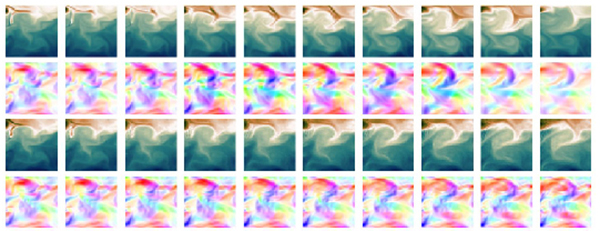 |
||
Home > TERATEC FORUM > Workshops > Workshop 6
Wednesday October 14, 2020 - Workshops
Workshop 06 - 11:00 to 12:30
AI in scientific computing : accelerating innovation in industrial and academic domain
Chared by Eric Petit, Research engineer, HPC application specialist, Intel and Michaël Krajecki, Agence de l’Innovation de Défense (AID)
Deep Learning for Modeling Physical Processes
 |
| Fig: Forecasting ocean circulation dynamics. Rows 1 and 2 respectively, ground truth, sea surface temperature and velocity field, rows 3 and 4 Deep Learning predictions |
Deep Learning has become in a few years the state of the art paradigm for data analysis and modeling. Its main successes are however still restricted to the numerical world, e.g. semantic data analysis or games. The observation and analysis of complex physical processes arising in industrial domains like aeronautics or energy production and in domains like environment also generate large amounts of data. The main modeling paradigm in all these fields still mainly relies on the physical knowledge of the observed phenomenon. A recent trend of research consists in developing the interplay between the model based approaches inherited from physics and numerical analysis on one side and statistical machine learning on the other side.
This raises new challenges for machine learning that are only starting to be explored. I will focus in this presentation on the modeling of dynamical systems and present some recent advances enhancing connections and complementarities between deep learning and physical modeling. I will highlight some recent ideas on the development of hybrid systems exploiting these complementarities. I will illustrate these ideas with use cases from different domains.
 |
Biography : Patrick Gallinari is a professor at Sorbonne University and distinguished researcher at Criteo AI Lab - Paris. His research focuses on statistical learning and deep learning with applications in different fields such as semantic data processing or complex data analysis. Together with colleagues from Sorbonne University, he started to explore in 2017 the development of physico-statistical systems combining the model based approaches of physics and the data processing approaches of statistical learning. He has been a pioneer in the development of Neural Networks in the 90ies. He leads a team whose central theme is Statistical Learning and Deep Learning (https://mlia.lip6.fr). He was director of the Paris 6 computer lab (LIP6) from 2005 to 2013. |
|---|
Register now and get your badge here
- TERATEC Forum is strictly reserved for professionals.
- Participation to exhibition, conferences and workshops is free (subject to seats available)
- On line registration is obligatory.